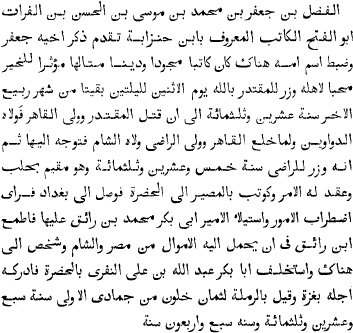Article contents
IV. The Discussion between Abu Bishr Matta and Abu Sa‘id al-Sirafi on the Merits of Logic and Grammar
Published online by Cambridge University Press: 15 March 2011
Extract
In his notice of the philosopher Abū Bishr, of Dair Ḳunnā, Ibn al-Ḳiftī mentions that he had a public discussion with the grammarian Abū Sa‘īd al-Ḥasan al-Sīrāfī, famous for his commentaries on Sībawaihi's grammar. This discussion is reported at length by Yāḳūt in his invaluable Mu‘jam al-udabā, on the authority of Abū Ḥayyān, from whose works Yāḳūt derives much that is interesting, though he accuses Abū Ḥayyān of habitually romancing. Abū Ḥayyān, whose full name was ‘Alī Ibn Muḥammad al-Tauḥīdī, was an eminent writer of the fourth century of Islam, of whose works only three (to the best of my knowledge) have as yet been published: his treatises on Friendship and the Sciences, printed at the Jawā‘ib press in 1301 a.h.—without the very important treatise on the lives of the two viziers Ibn al-‘Amīd and Ibn ‘Abbād, which had been promised in advertisements, but which is said to be a book that brings ill-luck; and a work lithographed in India called Muḳābasāt. A brief account of him is given by Ibn Khillikān in his life of Ibn al-‘Amīd (translated by De Slane, iii, 264) ; a lengthier one by Ṣafadī, which Mr. Amedroz has kindly copied for me, and which is given in a note; and a very lengthy one by Yāḳūt, in the fifth volume of his dictionary. An extract from one of his works, which occurs in al-Ḳiftī's dictionary, is translated into German by Dieterici (“ Philosophie der Araber,” i, 144).
- Type
- Original Communications
- Information
- Copyright
- Copyright © The Royal Asiatic Society 1905
References
page 79 note 1 Ed. Lippert, p. 323.
page 79 note 2 These were utilized by Jahn for his translation, and have been published in part in the Cairene edition of Sībawaihi.
page 79 note 3 MS. Bodl. Or. 753 : Life of Abū Sa‘īd.
page 79 note 4 I owe my acquaintance with this work to Mr. A. G. Ellis.
page 81 note * Read ![]() .
.
page 82 note 1 A short life of him is given by Ṣafadi thus:—

page 83 note 1 Ikhshīd, according to Sibṭ Ibn al-Jauzī, means ‘ king ’ in the language of Farghānah.
page 83 note 2 Asked why he was called Khuldī, he said : ![]() . Jauzī says Yā Khuldi here is meaningless.
. Jauzī says Yā Khuldi here is meaningless.
page 86 note 1 ![]() , misread
, misread ![]() , Anal. Orient., pp. 66, 14.
, Anal. Orient., pp. 66, 14.
page 87 note 1 The most recent account of the matter is in the third part of Zaidān's “ History of Islamic Civilization.”
page 88 note 1 Jāḥiẓ, “ Misers,” p. 1; Bayān, i, 98; Ḥadā’iḳ al-Afrāḥ, 214.
page 88 note 2 Cf. ibid., 46 (Comm. on Lāmiyyat al-‘Ajam).
page 88 note 3 The verb ![]() . See De Goeje's glossary.
. See De Goeje's glossary.
page 88 note 4 ![]() , p. 168.
, p. 168.
page 89 note 1 Ibn Sa‘īd calls him ![]() , which (on the analogy of the Greek οὗτος) might imply that he was living at the time. This would be a serious anachronism.
, which (on the analogy of the Greek οὗτος) might imply that he was living at the time. This would be a serious anachronism.
page 89 note 2 This fact is omitted in the account of him by Dieterici, “ Philosophie der Araber,” i, 153.
page 93 note 1 Read ![]() .
.
page 93 note 2 Read ![]() .
.
page 93 note 3 Perhaps ![]() .
.
page 93 note 4 Read ![]() .
.
page 94 note 1 Perhaps ![]() .
.
page 94 note 2 Cod. ![]() .
.
page 95 note 1 Add ![]() ?
?
page 95 note 2 ![]() ?
?
page 95 note 3 Cod. ![]() .
.
page 95 note 4 Read ![]() .
.
page 96 note 1 Read ![]() .
.
page 96 note 2 Read ![]() ?
?
page 96 note 3 Add ![]() .
.
page 97 note 1 Cod. ![]() .
.
page 99 note 1 Read ![]() .
.
page 99 note 2 Cod. ![]() .
.
page 101 note 1 Verse of Ru’bah: see Mughnī of Ibn Hishām (1302), ii, 35 ; and Mufaṣṣal, § 608.
page 101 note 2 Surah xxxvii, 103.
page 101 note 3 Verse of Imru’ul-Ḳais: Ahlw. 147, 27.
page 101 note 4 Surah iii, 41.
page 102 note 1 Read ![]() .
.
page 102 note 2 ? Perhaps ![]() (Hamadhani, Maḳ. 38).
(Hamadhani, Maḳ. 38).
page 102 note 3 Read ![]() .
.
page 102 note 4 Read ![]() .
.
page 103 note 1 Perhaps ![]() .
.
page 105 note 1 Perhaps ![]() .
.
page 106 note 1 Perhaps ![]() .
.
page 107 note 1 Cod. ![]() .
.
page 107 note 22 Read ![]() .
.
page 108 note 1 Read ![]() .
.
page 108 note 2 Read ![]() .
.
page 109 note 1 Read ![]() .
.
page 109 note 2 Cod. ![]() .
.
Page 109 note 3 Cod. ![]() .
.
page 118 note 1 This seems corrupt.
page 124 note 1 The symbols in the text are corrupt.
- 7
- Cited by




